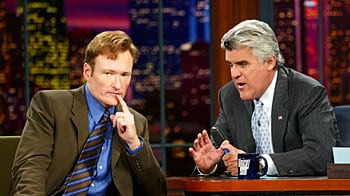You are a late-night skeptic. Yeah, you used to watch Letterman (both shows). And you happily discovered Conan (the first show). But then you tried to watch Conan’s second show and it made you want to impale yourself on the remote. Now, you visit the stations of the late-night cross: Stewart, Colbert, Kimmel, Handler. But the whole premise of sitting down, DVR-less, and watching network TV after the local news seems moldly, like attending a taping of The Price Is Right or taking in a country-music concert—in Branson.
But the epic Tonight Show battle of 2010 made you reconsider. Conan vs. Jay vs. Dave vs. Jimmy revealed that late-night TV wasn’t just a dead zone of horrid one-liners and animal acts. Maybe those talk shows—viewed the next morning on YouTube, of course—had real juice. And now comes Bill Carter’s new book, The War for Late Night, which makes last year’s battle royale seem far more interesting than the programs themselves.

So as Tom Snyder used to say: Sit back, relax, and watch the inside dope as it flies through the air.
Wait, someone wrote a book about the whole Jay-Conan thing?

Yes, and it’s Bill Carter, the New York Times media reporter who wrote The Late Shift (1994), the seminal book about late-night angst. Carter embeds in the talk-show world as naturally as Dexter Filkins does with Bravo Company.
Can you just remind me of the basics again? I was watching Chelsea Lately.
In 2009, Conan O’Brien took over NBC’s The Tonight Show. Theoretically, this meant Jay Leno was out of a job. Except NBC just moved Jay to 10 p.m., a treacherous 95 minutes ahead of Conan’s show, meaning they were still side-by-side on the same channel. This is like Hillary Clinton becoming secretary of State in the Obama administration, except 1,000 times worse.
As Conan says with eerie premonition, “I just think that guy is going to hurt me.”
Is all of that really book-worthy?
It’s true that in 394 pages, Carter doesn’t much alter the narrative as we know it, which is that Conan got royally screwed. But he adds reams of blind quotes about all the key players and compelling stories of grasping TV executives. The book is remarkably good given that America already watched the whole thing play out on YouTube.
I always liked Conan. How does he come off?
Smart, sympathetic, and a bit naïve. Carter supplies some key contextual scenes. As a young Saturday Night Live writer, Conan sneaks into Letterman’s Late Night studio and sits in his hero’s chair, imagining himself as Dave’s heir. We also see Conan balking at a lucrative writing career on The Simpsons because he wants to be a performer. In 1993, he infuriates SNL capo Lorne Michaels by turning down a job as producer and writer on NBC’s new, post-Letterman Late Night show, leading Michaels, after a time, to tap Conan to host the thing.
Unlike just about every performer in late night, Conan seems to be an actual human being. He’s constantly thinking not just about his place on the schedule but his place in the moral universe. That’s part of his undoing.
So Conan was just too nice?
Or too loyal. He makes the classic mistake of thinking that NBC, the network that made his career, has his best interests at heart. In 2004, he’s promised The Tonight Show, but told he has to wait five years while Jay takes an endless victory lap. You want to yell, “Don’t do it!” Especially because this wasn’t the first time NBC screwed over a late-night host. Letterman had the same NBC loyalty gene, as did Leno, for that matter. It’s weird. For a bunch of seemingly streetwise guys, they see NBC as a place where the benevolent spirits of Johnny Carson and Jack Paar will protect them from harm.
How devastated was Conan when Jay took back The Tonight Show?
“Shattered to his last bone,” writes Carter. When Letterman asks him to star in the olive-branch Super Bowl ad that later featured Oprah Winfrey and Leno, Conan says, “No fucking way I’m doing that. It’s not a joke to me—it’s real.”
Is Jay Leno evil?
No.
Really?
It’s a myth. Here’s the real story as Carter sees it: Jay gets bumped from Tonight. Then NBC gives him an insane offer: five nights a week in prime time doing a similar show. Leno takes the offer. When that show fails miserably and Conan’s ratings falter, NBC asks him if he’ll take his old time slot back. Jay says yes.
That’s it—the extent of Jay’s involvement. Carter’s reportorial nose can’t sniff a single dirty machination against Conan, or an ounce of undue pressure applied to the network. Leno didn’t even have an agent. Conan had Ari Emanuel.
But Conan and Dave and Jimmy Kimmel and everyone on the Internet blasted Jay. For weeks. How could they all be wrong?
It’s a funny thing about late-night TV. Everybody is still pissed off about the time in 1992 when Jay beat out Dave for The Tonight Show. Carter calls that event the “original sin,” and it looms over late night just like Eve’s apple-craving looms over a Calvinist.
According to the Gospel of Dave, Jay is the jerk who took Letterman’s dream job and insists on staying on TV despite the fact that everybody hates him. Conan, as noted above, is a Letterman guy. Kimmel is also a Letterman guy—the license plate of his first car read “L8 NITE.” Letterman is a Letterman guy.
But even if we stipulate that it was Jay and not NBC that screwed Dave out of The Tonight Show—a highly debatable proposition—it has been 18 years since this happened. And what did the world suffer? Dave walked to CBS, where he made more than Jay’s annual salary, took ownership of his show, and treated his network bosses with contempt. No one in America was deprived of seeing Dave Letterman do exactly what he wanted with an 11:35 television program.
Fast-forwarding 18 years, for all of his public suffering Conan collected a $32 million severance from NBC, millions more from TBS, and, starting tonight, will put together exactly the show he wants on another network. At some point, the 1992 stuff has to be put to rest. Yes, Jay is chronically unfunny. But no, he’s not a monster.
What about Jeff Zucker, the old NBC chief?
Total monster.
He seemed to be terrible at putting together a network schedule.
Zucker had two big calls to make. He whiffed on both of them. His idea to put Jay at 10 didn’t work, and the network’s later offer that Jay would move to 11:35 and Conan to 12:05 a.m. didn’t work, either. That’s what evoked Conan’s famous screw-you letter to NBC. (He wrote it aloud while his wife typed.)
The defense of Zucker, as told by Carter, goes like this: By stringing Conan along pre- Tonight, he squeezed five extra years out of him and kept him off a rival network. And then he damaged Conan’s reputation to the point that he’ll never again be a true competitor to NBC. That’s the positive reading of Zucker’s role here.
Just how crazy did all of this get? What didn’t we see?
The network insisted that Conan couldn’t book Howard Stern during his last week on air. As big a drubbing as NBC took in those final shows, apparently they feared it could be worse.
Tell me about Dave. Everybody wants to know about Dave.
Carter never really takes a sledgehammer to anyone, including Zucker. But he comes awfully close with Letterman.
In the last few years, Dave’s ratings have been blessed by a few big events: his 2008 standoff with John McCain; his joke about Sarah Palin’s daughter; his self-insertion into Cocogate; and his subsequent blackmailing by a 48 Hours producer. But outside of those moments, it’s no secret that his show is running on autopilot.
As Carter notes, Dave long ago began taping his Friday show on the previous Mondays, making them stale and devoid of fresh jokes. When Conan entered the arena on Tonight, Dave’s big countermeasure was to… extend his monologue. As Carter writes, “Within the limits of the energy [Letterman] was now willing to expend, he was still trying.” Talk about faint praise.
Carter also tells us that Dave’s staff has diagnosed him with something like narcissism. It’s nice to see that laid bare. When Letterman is producing great television—as he did after September 11—they could tolerate the repulsive behavior. When he isn’t, it’s just repulsive, and miserable for the people around him.
What about Jimmy Kimmel?
He comes off like an emerging player. Carter reveals that Jay made weird, borderline mentorly calls to Kimmel long before the Conan contretemps began. He was buttering him up in case he needed to come to ABC. But Kimmel didn’t let avuncular relationship stop him from pummeling Jay when the time came. His evisceration of Leno on The Jay Leno Show is one for the vault.
So what does Carter miss?
That Conan’s Tonight show was completely unwatchable with the exception of his final weeks. This rocks the whole narrative: Jay’s show is terrible, Dave’s show is mediocre, and Conan’s wasn’t much better. They all stink. Late night in 2010 was a battle to see who could maintain his bad comedy show.
So the lesson of this war is what? That comedy isn’t the reason we still care about late night?
There are many of us who want late night to be funny. But absent that, what’s captivating about it—and Carter is partly responsible for this—is its big moral battles. Jay vs. Dave. Conan vs. Jay. Jay vs. Dave, Round 2. There’s no part of TV that is treated quite like this, not the network newscasts, the morning shows, the Sunday political roundtables, nothing. The magic of that little moment in 2010 is that it reduced a lot of unruly elements like demographics and lead-ins and the splintering of the network audience to a pure mano-a-mano comedian rumble—may the most cutting joke win.
As Carter notes, even Jay—the most guileless one—told a joke about Dave’s poor wife. And you know what? It was funny.
Bryan Curtis is a national correspondent at The Daily Beast. He was a columnist at Play: The New York Times Sports Magazine, Slate, and Texas Monthly, and has written for GQ, Outside, and New York. Write him at bryan.curtis at thedailybeast.com.






